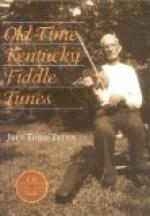“Then it is you who will ruin him.”
While they had been talking an idea had sprung to sudden flower in Madge’s mind. It was a daring, an unheard of plan that had occurred to her. There were details of it which filled her with shrinking. She knew that if she put it into practice, and it ever became generally known, she would be the talk of Lexington and that not all that talk would be complimentary. She knew that, after she had carried out the plan, even the man for whom she thought of doing it might look at her with scorn. But it was the only plan which her alert and anxious brain could find which promised anything at all. And if it won, perhaps—perhaps—he might not scorn her! At any rate it was a sacrifice, and sacrifice for him was an attractive thought to her.
“Me ruin him?” she said to Barbara. “Don’t you be too sure! There is a shorter and a better way nor yours, to save him, an’ I’m goin’ to try it!”
The bluegrass girl, astonished, would have questioned her, but Madge waited for no questioning. Without another word she hurried from the room, in a mad search for Colonel Doolittle.
* * * * *
From the country round about for miles the planters had come into Lexington upon their blooded mounts, their wives, daughters, sweethearts, riding in great carriages. Now and then a vehicle, coming from some far-away plantation, was drawn by a gay four-in-hand, and the drivers of such equipages, negroes always, showed a haughty scorn of their black fellow-men who travelled humbly on the backs of mules, or trudged the long and dusty way on foot. Gorgeous were the costumes of the ladies whom the carriages conveyed; elegant the dress of the gay gentlemen who rode beside the vehicles on prancing steeds, gallant escorts of Kentucky’s lovely womanhood, prepared, especially, to watch the carriage-horses when the town was reached and guard against disasters due to their encounter with such disturbing and unusual things as crowds, brass-bands and other marvels of a great occasion.
Everywhere upon the sidewalks people swarmed like ants, delighted with the calm perfection of the day, the magnetism of the crowds, the blare of martial music, the novelty of passing strangers, and, above all, by the prospect of the great race which, for weeks, had been the theme of conversation everywhere throughout the section.
In the spacious corridors and big bar-rooms of the city’s hostelries the rich men of the section vied with flashily dressed strangers, in magnitude of wagers, and the gambling fever spread from these important centers to the very alleys of the negro quarters. Poor indeed was the old darkey who could not find two-bits to wager on the race; small, indeed, the piccaninny who was not wise enough in the sophisticated ways of games of chance to lay a copper with a comrade or to join a pool by means of which he and his fellows were enabled to participate in more important methods of wooing fickle Fortune.




